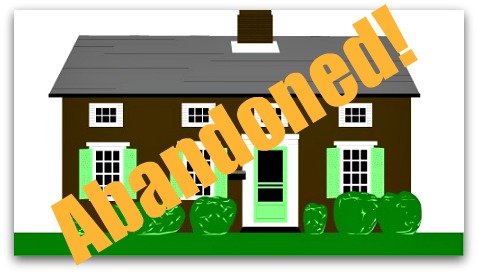Wind turbines devastate property value (CBC News, Ontario)
Oct 1, 2011
“Ontario wind power bringing down property values”
 None of the images on this page were included in the CBC article—Editor
None of the images on this page were included in the CBC article—Editor
.
—John Nicol & Dave Seglins, CBC News (10/1/11)
Ontario’s rapid expansion in wind power projects has provoked a backlash from rural residents living near industrial wind turbines who say their property values are plummeting and they are unable to sell their homes, a CBC News investigation has found.
The government and the wind energy industry have long maintained turbines have no adverse effects on property values, health or the environment.
The CBC has documented scores of families who’ve discovered their property values are not only going downward, but also some who are unable to sell and have even abandoned their homes because of concerns nearby turbines are affecting their health.
“I have to tell you not a soul has come to look at it,” says Stephana Johnston, 81, of Clear Creek, a hamlet in Haldimand County on the north shore of Lake Erie, about 60 kilometres southeast of London.
Johnston, a retired Toronto teacher, moved here six years ago to build what she thought would be her dream home. But in 2008, 18 industrial wind turbines sprung up near her property and she put the one-floor, wheelchair-accessible home up for sale.
“My hunch is that people look at them and say: ‘As nice as the property is going south, looking at the lake, we don’t want to be surrounded by those turbines.’ Can’t say that I blame them.”
Johnston says she has suffered so many ill health effects, including an inability to sleep — which she believes stem from the noise and vibration of the turbines— that she now sleeps on a couch in her son’s trailer, 12 kilometres away, and only returns to her house to eat breakfast and dinner and use the internet.
.
Industry rejects claims of lower land values
Meanwhile, the industry rejects claims of lower land values.
“Multiple studies, and particularly some very comprehensive ones from the United States have consistently shown the presence of wind turbines does not have any statistically significant impact on property values,” says Robert Hornung of the Ottawa-based Canadian Wind Energy Association (CANWEA).
While acknowledging a lack of peer-reviewed studies in Ontario, Hornung says CanWEA commissioned a study of the Chatham-Kent area, where new wind turbines are appearing, and found no evidence of any impact on property values.
“In fact,” says Hornung, “we’ve recently seen evidence coming from Re/Max indicating that we’re seeing farm values throughout Ontario, including the Chatham-Kent area, increasing significantly this year as wind energy is being developed in the area at the same time.”
However, Ron VandenBussche, a Re/Max agent along the Lake Erie shore, said the reality is that the wind turbines reduce the pool of interested buyers, and ultimately the price of properties.
“It’s going to make my life more difficult,” says VandenBussche, who has been a realtor for 38 years. “There’s going to be people that would love to buy this particular place, but because the turbines are there, it’s going to make it more difficult, no doubt.”
Kay Armstrong is one example. She put her two-acre, waterfront property up for sale before the turbines appeared in Clear Creek, for what three agents said was a reasonable price of $270,000.
Two years after the turbines appeared, she took $175,000, and she felt lucky to do that — the property went to someone who only wanted to grow marijuana there for legal uses.
“I had to get out,” said Armstrong. “It was getting so, so bad. And I had to disclose the health issues I had. I was told by two prominent lawyers that I would be sued if the ensuing purchasers were to develop health problems.”
.
Realtor association finds 20 to 40 per cent drops in value
Armstrong’s experience is backed up in a study by Brampton-based realtor Chris Luxemburger. The president of the Brampton Real Estate Board examined real estate listings and sales figures for the Melancthon-Amaranth area, home to 133 turbines in what is Ontario’s first and largest industrial wind farm.
“Homes inside the windmill zones were selling for less and taking longer to sell than the homes outside the windmill zones,” said Luxemburger.
On average, from 2007 to 2010, he says properties adjacent to turbines sold for between 20 and 40 per cent less than comparable properties that were out of sight from the windmills.
.
Power company sells at a loss
Land registry documents obtained by CBC News show that some property owners who complained about noise and health issues and threatened legal action did well if they convinced the turbine companies to buy them out.
Canadian Hydro Developers bought out four different owners for $500,000, $350,000, $305,000 and $302,670. The company then resold each property, respectively, for $288,400, $175,000, $278,000 and $215,000.
In total, Canadian Hydro absorbed just over half a million dollars in losses on those four properties.
The new buyers were required to sign agreements acknowledging that the wind turbine facilities may affect the buyer’s “living environment” and that the power company will not be responsible for or liable from any of the buyer’s “complaints, claims, demands, suits, actions or causes of action of every kind known or unknown which may arise directly or indirectly from the Transferee’s wind turbine facilities.”
The energy company admits the impacts may include “heat, sound, vibration, shadow flickering of light, noise (including grey noise) or any other adverse effect or combination thereof resulting directly or indirectly from the operation.”
TransAlta, the company that took over for Canadian Hydro, refused to discuss the specific properties it bought and then resold at a loss in Melancthon. But in an email to CBC, spokesman Glen Whelan cited the recession and other “business considerations” that “influence the cost at which we buy or sell properties, and to attribute purchase or sale prices to any one factor would be impossible.”
.
Province says no change to tax base
Ontario’s ministers of Energy, Municipal Affairs and Finance, all in the midst of an election campaign, declined requests for an interview.
That’s what makes them sick is that, you know, they’ll get less money for their properties, and that’s what’s causing all this annoyance and frustration.
—Environment Ministry lawyer Frederika Rotter
A spokesperson for Municipal Affairs says his ministry has no studies or information about the potential impact wind turbines are having on rural property values.
However, last February, before an environmental review tribunal in Chatham, Environment Ministry lawyer Frederika Rotter said: “We will see in the course of this hearing that lots of people are worried about windmills. They may not like the noise, they may think the noise makes them sick, but really what makes them sick is just the windmills being on the land because it does impact their property values.
“That’s what makes them sick is that, you know, they’ll get less money for their properties, and that’s what’s causing all this annoyance and frustration and all of that.”
When Energy Minister Brad Duguid declined comment, his staff referred CBC News to the Ministry of Finance, which oversees MPAC (the Municipal Property Assessment Corporation), which sets values on land for taxation purposes. They indicated that MPAC has no evidence wind turbines are driving down assessed values.
However, CBC found one household in Melancthon was awarded a 50-per-cent reduction in property tax because the house sat next to a transformer station for the turbines.
.
Losing the rural life
Almost all the people interviewed by the CBC rue the division between neighbours for and against the turbines, and said what they have lost is a sense of home and the idyllic life of living in the countryside.
Tracy Whitworth, who has a historic home in Clear Creek, refuses to sell it and instead has become a nomad, renting from place to place with her son, to avoid the ill effects of the turbines.
“My house sits empty — it’s been vandalized,” says Whitworth, a Clear Creek resident who teaches high school in Delhi. “I’ve had a couple of ‘Stop the wind turbine’ signs knocked down, mailbox broken off.
“I lived out there for a reason. It was out in the country. School’s very busy. When I come home, I like peace and quiet. Now, we have the turbines and the noise. Absolutely no wildlife. I used to go out in the morning, tend to my dogs, let my dogs run, and I’d hear the geese go over.
“And ugh! Now there’s no deer, no geese, no wild turkeys. Nothing.”
For the octogenarian Johnston, the fight is all more than she bargained for. She sank all her life savings, about $500,000, into the house, and she says she does not have the money to be able to hire a lawyer to fight for a buyout. But she is coming to the conclusion she must get a mortgage to try the legal route.
“I love being near the water and I thought, what a way to spend the rest of my days — every view is precious,” she said, as tears filled her eyes. “And I would not have that any more.
“And that is hard to reconcile and accept.”
Getting a mortgage on her house might not be that easy. CBC News has learned that already one bank in the Melancthon area is not allowing lines of credit to be secured by houses situated near wind turbines. In a letter to one family situated close to the turbines, the bank wrote, “we find your property a high risk and its future marketability may be jeopardized.”






Comment by Mike McCann, McCann Appraisal LLC (Chicago) on 10/01/2011 at 6:41 pm
It seems to me the developer’s own willingness to accept a price much lower than what was bought out is an admission against interest, and demonstrates value loss acknowledgment, by the source itself. It is also consistent with the one other cited sale that did not involve the developer in the sale or resale, at a 35% loss. Any potential future claim of non-market re-sale prices is contradicted by independent sale activity.
Ground-zero data is far more reliable than regression analyses of 7,000 sales from 5+ miles distant, but the wind industry never discloses the nearby data at hearings. Only the Hoen regression study.
The CanWEA spokesman wishes to cite farm land price increases to refute rural single family home’s actual value declines? He flunks real estate appraisal 101, under the heading: ” “Can’t tell an apple from an orange.” It may well be that some investors pay more for large land tracts in the vicinity of wind projects, hoping to capitalize on the wind development trend by leasing for the almost inevitable project expansion. However, that does little to address impacts on occupied residential homes.
In the project area of this article, value losses ranged from 9% to 50%, and averaged 32.5%.
$Buyout minus $ Resale equals $Loss or % Loss
$500,000 – $288,400 = ($211,600) or (42%)
$350,000 – $175,000 = ($175,000) or (50%)
$305,000 – $278,000 = ($27,000) or ( 9%)
$302,670 – $215,000 = ($87,670) or (29%)
Michael S. McCann
McCann Appraisal, LLC
500 North Michigan Avenue, Suite # 300
Chicago, Illinois 60611
Real Estate Appraisal & Consulting
Phone: (312) 644-0621
mikesmccann@comcast.net

.
Mike McCann
Comment by Colette, in Northern New York. on 10/01/2011 at 8:55 pm
From the very beginning, I have seen one very self-evident fact, Employees for Wind Turbine Companies Lie. For example Robert Hornung, in the article above. Even when they are caught in a lie, they just try to squirm out of it.

.
.
And I’ve also seen people at town meetings not push the envelope when they catch them in lies. We don’t say it straight out, “Hey, you just lied!” We need to do more of that by calling a snake a snake and not a little worm. We need to start holding people’s feet to the fire. Make it personal. It’s very personal what they are doing to us.
Comment by Tom Whitesell on 10/01/2011 at 11:28 pm
Is there a clinical name for this type of lying? Blatant lying to the public in the face of the obvious? As though there weren’t even any question of fudging or manipulating facts? Pathological? Sociopathic? This guy’s comments are completely absurd, and yet they are taken as statements of fact. As though one could say, “Extensive research has clearly demonstrated that the sun rises in the west on Wednesdays and Thursdays.”

.
.
How much is he paid to be a pathological liar, or moron, or even worse? What has he been smoking? Is that his summer home in the background of the photo?
Comment by Mark Duchamp on 10/02/2011 at 7:01 am
They lie about property values, they lie about effects on tourism, they lie about effects on birds and bats, and on so many other things, starting with health effects on windfarm neighbors.

.
.
The whole industry is based on a lie: “Wind turbines save on fossil fuels and CO2 emissions!”
No wonder ENRON was the founder. The grand-daddy of all these shysters.
Mark
Comment by Paul on 10/04/2011 at 3:46 am
You poor buggers, there seems to be no end to the nonsense and spin that the turbine developers and politicians who want to seem “green” will spout.

.
.
I’ve had a turbine developer tell me to my face that my property value won’t be reduced by 150m high turbines 2km away! I was so stunned by this baldfaced denial of the obvious that I could barely respond.
These things are diabolical. Worst part is, they divert our attention and resources from other more promising and technically feasible solutions to our energy needs.
Paul
Comment by Louis on 10/05/2011 at 5:06 am
I live in Australia in a little town called Leonards Hill. We have two turbines at the back of our rural property, which are about 500 metres from our back door. We were told all the usual wind company bullshit that I’ve read on this website, and I can tell you we are getting sicker by the day and going mad at the same time.

.
.
Hepburn Wind has told us lies from the beginning and they continue to do so, and even to mislead communities that they have suckered in by their shares. LIES, LIES AND MORE LIES.